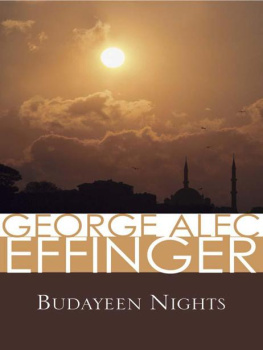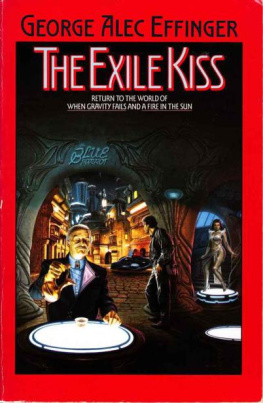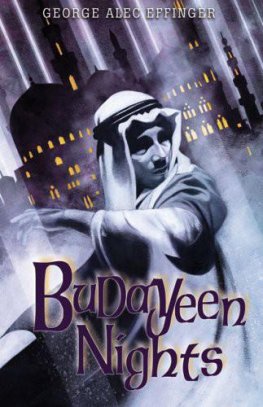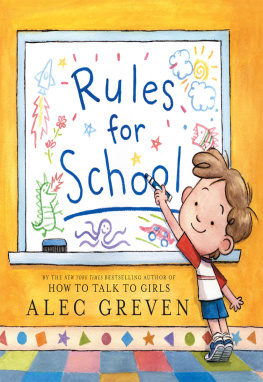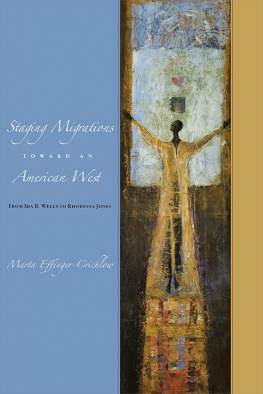George Alec Effinger - Budayeen Nights
Here you can read online George Alec Effinger - Budayeen Nights full text of the book (entire story) in english for free. Download pdf and epub, get meaning, cover and reviews about this ebook. year: 2010, publisher: E-Reads, Ltd., genre: Art. Description of the work, (preface) as well as reviews are available. Best literature library LitArk.com created for fans of good reading and offers a wide selection of genres:
Romance novel
Science fiction
Adventure
Detective
Science
History
Home and family
Prose
Art
Politics
Computer
Non-fiction
Religion
Business
Children
Humor
Choose a favorite category and find really read worthwhile books. Enjoy immersion in the world of imagination, feel the emotions of the characters or learn something new for yourself, make an fascinating discovery.
- Book:Budayeen Nights
- Author:
- Publisher:E-Reads, Ltd.
- Genre:
- Year:2010
- Rating:5 / 5
- Favourites:Add to favourites
- Your mark:
- 100
- 1
- 2
- 3
- 4
- 5
Budayeen Nights: summary, description and annotation
We offer to read an annotation, description, summary or preface (depends on what the author of the book "Budayeen Nights" wrote himself). If you haven't found the necessary information about the book — write in the comments, we will try to find it.
Budayeen Nights — read online for free the complete book (whole text) full work
Below is the text of the book, divided by pages. System saving the place of the last page read, allows you to conveniently read the book "Budayeen Nights" online for free, without having to search again every time where you left off. Put a bookmark, and you can go to the page where you finished reading at any time.
Font size:
Interval:
Bookmark:
With a Foreward and Story
Introductions by Barbara Hambly
Copyright 2003 by the Estate of George Alec Effinger.
Published by E-Reads. All rights reserved.
ISBN-10: 0-7592-9670-7
ISBN-13: 978-0-7592-9670-1
1947-2002
Foreword, copyright 2003 by Barbara Hambly.
The City on the Sand, first published in The Magazine of Fantasy and Science Fiction , April 1973.
King of the Cyber Rifles, first published in Isaac Asimovs Science Fiction Magazine , Mid-December 1987.
Mard and the Trail of Blood, first published in Sisters of the Night , edited by Barbara Hambly and Martin H. Greenberg, Warner Aspect, 1995.
Mard Changes His Mind, first published in Isaac Asimovs Science Fiction Magazine , May 1989.
Mard Throws a Party, copyright 2003 by the Estate of George Alec Effinger. Originally written as the first two chapters of Word of Night , the fourth Mard Audran novel. Previously unpublished.
The Plastic Pasha, copyright 2003 by the Estate of George Alec Effinger.
Previously unpublished.
Schrdingers Kitten, first published in Omni , September 1988.
Slow, Slow Burn, first published in Playboy , May 1988.
The World as We Know It, first published in Futurecrime , edited by Cynthia Manson and Charles Ardai, Fine, 1992.
Copyright 2003 by the Estate of George Alec Effinger. These stories were first published in slightly different form and appear here in the authors preferred text.
Foreword and Story Introductions copyright 2003 by Barbara Hambly Cover illustration copyright 2003 by John Picacio
Edited by Marty Halpern
For Nell, Denise, Helen, Valerie,
and all the others without whom
there would be no Budayeen.
-GAE
IT ALWAYS SURPRISED GEORGE WHEN PEOPLE WOULD refer to him as a science fiction writer.
It was a natural perception, of course, of someone who made his debut under the auspices of Damon Knight; and to the end of his days, George used a science-fiction palette to tell fantasy stories. But it wasnt until he began writing the Budayeen novels When Gravity Fails, A Fire in the Sun , and The Exile Kiss that he settled fully into science fiction mode, and reinvented himself as one of the founding fathers of Cyberpunk.
The setting of the Budayeen came about quite naturally, and is intrinsic to the writing of Gravity . George had a very dark side to his nature, a fascination with the underworld and the demimonde that came about, I think, because many of his mothers friends were hookers and strippers back in Cleveland: he used to go and watch them dance when he was in his early teens. Maybe this was why he was so comfortable in the shadow-world of New Orleans. (I still remember my first visit to New Orleans, sitting in a bar with George, talking to the barmaid, and watching the dancer on the runway: George leaned over to me and whispered, Youre the only genetically female person in this room.)
Hed hang out in the bars along Chartres and Decatur Streets, nursing a drink, talking to the girls and not-quite-girls, and playing pinball until nearly dawn. He was good friends with a lot of the denizens of that world, including a sexchange named Amber who took the wrong man home one night and ended up being beaten to death and thrown off a balcony.
The New Orleans police being what they were, no investigation was made.
Georges outpouring of outrage and helplessness became When Gravity Fails . He set it in the nameless Muslim city hed invented for The City on the Sandwhich became a pay-the-medical-bills book called Relatives because some of the characters were based on real people, including the local Mafia boss. But when you read it, its obviously the French Quarter, with maybe a little of the East Village in the sixties where George lived after dropping out of Yale. Being George, he studied Islamic culture extensively, so as not to inadvertently insult those whose world it actually is. He had the manuscript read by Muslim friends, and at one point the office staff of the local Islamic Cooperative Association phoned him up to compliment him on the respect hed shown for their faith and culture. (But were liberal Sunnis, the caller added. I dont know what the Shiites would say about it.)
George intended Gravity as a one-shot, but when it took off in popularity and Bantam asked him to do a second book, he found he did have another novel-length tale to tell of that universe, based around the death of his own grandfather, a Cleveland policeman who was killed in the line of duty. He said the Budayeen was the first world hed created that had depth and richness, whose characters lived lives of their own beyond the boundaries of any individual tale. I think this is the reason the world continues to fascinate: because it is real.
His protagonist, Mard Audran, fascinates and charms because he, too, is realor as real as things get in the Budayeen. George said frankly that, like the hapless science-fiction writer Sandor Courane of some of his other tales, Mard is based on himself. It amused George that many readers take Mard at Mards own evaluation of himself: cool, clever, street-smart, sharp. But in fact, George said, if you look at what Mard actually does rather than what he says , he is in fact cowardly, not nearly as clever as he thinks he is, and has a major drug problem which he never quite gets around to addressing.
Like Georgedearly as I loved him.
George had a lot of trouble working during the last twelve years of his life. Drugs, chronic pain, alcohol, and depression sapped his energy and his ability to focus: there were days when hed shove the same three or four words around the computer screen, other days when all he would do was spend hours sending long e-mails to friends, or troll around the Internet in the same fashion that he used to go down to the clubs on Chartres Street. It was heartbreaking to watch, and everyone who knew him tried everything they could think of
And of course, nothing worked. It seldom does.
One of the several tragedies connected with George was how much brilliant potential was wasted: what there could have been.
But what there is, in those three novels and the handful of short stories surrounding them, is unforgettable. Wry and strange and dark, it is a world peopled with folks whose connection with the technological marvels of the twenty-second century are by far the least strange thing about them.
George was above all a very delicate observer of human behavior, fascinated by what people do in their lives and how they do it. The novels tell the main story. These vignettes, these fragments, fill in background to that worldin many ways the most interesting part of the world George created. They are what you see when you sit in the bars and cafes of the Budayeen in the sweltering neon darkness, watching the folks go by on the sidewalk, the way the clueless Ernst Weinraub in The City on the Sand watches: the way George would watch folks in the Quarter.
This is the world of Budayeen Nights.
Barbara Hambly
Los Angeles
October 2002
Schrdingers Kitten
This is probably the best known of Georges short Budayeen stories. It won the Hugo, Nebula, and Seiun Awards, and touches deep chords in nearly every reader, for it deals withand conquersdeep and universal fears.
Fear of death; fear of change; fear of somehow doing something wrong that will condemn ones self to a horrible fate. In a way it is every childs fear. It reconstructs Schrdingers philosophical image of the cat in the boxdead or saved only by the opening of the box by an observerinto an infinity of paths and variations of hope and destiny. Others have done thisnotably Larry Niven in his story All the Myriad Waysbut to different effect.
Font size:
Interval:
Bookmark:
Similar books «Budayeen Nights»
Look at similar books to Budayeen Nights. We have selected literature similar in name and meaning in the hope of providing readers with more options to find new, interesting, not yet read works.
Discussion, reviews of the book Budayeen Nights and just readers' own opinions. Leave your comments, write what you think about the work, its meaning or the main characters. Specify what exactly you liked and what you didn't like, and why you think so.

